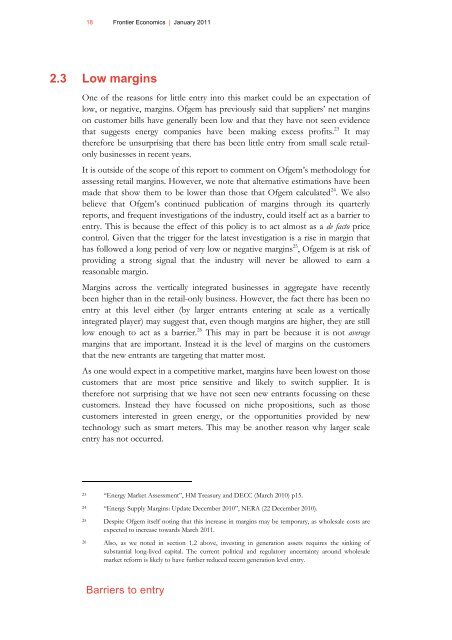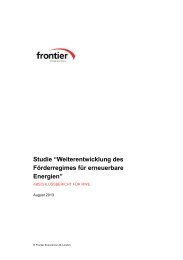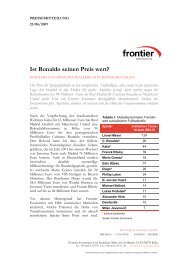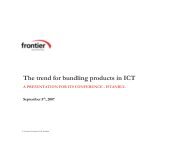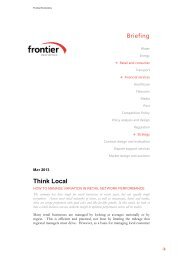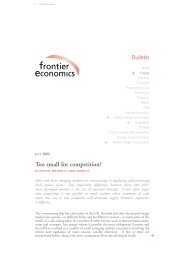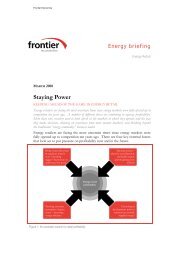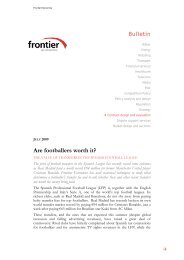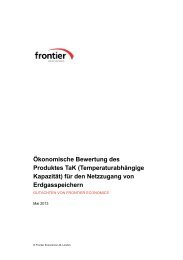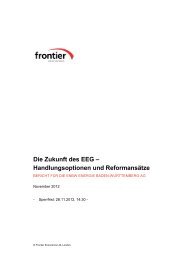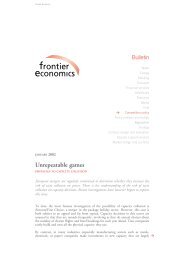competition and entry in the gb electricity retail market.pdf - Frontier ...
competition and entry in the gb electricity retail market.pdf - Frontier ...
competition and entry in the gb electricity retail market.pdf - Frontier ...
Create successful ePaper yourself
Turn your PDF publications into a flip-book with our unique Google optimized e-Paper software.
18 <strong>Frontier</strong> Economics | January 2011<br />
2.3 Low marg<strong>in</strong>s<br />
One of <strong>the</strong> reasons for little <strong>entry</strong> <strong>in</strong>to this <strong>market</strong> could be an expectation of<br />
low, or negative, marg<strong>in</strong>s. Ofgem has previously said that suppliers’ net marg<strong>in</strong>s<br />
on customer bills have generally been low <strong>and</strong> that <strong>the</strong>y have not seen evidence<br />
that suggests energy companies have been mak<strong>in</strong>g excess profits. 23 It may<br />
<strong>the</strong>refore be unsurpris<strong>in</strong>g that <strong>the</strong>re has been little <strong>entry</strong> from small scale <strong>retail</strong>only<br />
bus<strong>in</strong>esses <strong>in</strong> recent years.<br />
It is outside of <strong>the</strong> scope of this report to comment on Ofgem’s methodology for<br />
assess<strong>in</strong>g <strong>retail</strong> marg<strong>in</strong>s. However, we note that alternative estimations have been<br />
made that show <strong>the</strong>m to be lower than those that Ofgem calculated 24 . We also<br />
believe that Ofgem’s cont<strong>in</strong>ued publication of marg<strong>in</strong>s through its quarterly<br />
reports, <strong>and</strong> frequent <strong>in</strong>vestigations of <strong>the</strong> <strong>in</strong>dustry, could itself act as a barrier to<br />
<strong>entry</strong>. This is because <strong>the</strong> effect of this policy is to act almost as a de facto price<br />
control. Given that <strong>the</strong> trigger for <strong>the</strong> latest <strong>in</strong>vestigation is a rise <strong>in</strong> marg<strong>in</strong> that<br />
has followed a long period of very low or negative marg<strong>in</strong>s 25 , Ofgem is at risk of<br />
provid<strong>in</strong>g a strong signal that <strong>the</strong> <strong>in</strong>dustry will never be allowed to earn a<br />
reasonable marg<strong>in</strong>.<br />
Marg<strong>in</strong>s across <strong>the</strong> vertically <strong>in</strong>tegrated bus<strong>in</strong>esses <strong>in</strong> aggregate have recently<br />
been higher than <strong>in</strong> <strong>the</strong> <strong>retail</strong>-only bus<strong>in</strong>ess. However, <strong>the</strong> fact <strong>the</strong>re has been no<br />
<strong>entry</strong> at this level ei<strong>the</strong>r (by larger entrants enter<strong>in</strong>g at scale as a vertically<br />
<strong>in</strong>tegrated player) may suggest that, even though marg<strong>in</strong>s are higher, <strong>the</strong>y are still<br />
low enough to act as a barrier. 26 This may <strong>in</strong> part be because it is not average<br />
marg<strong>in</strong>s that are important. Instead it is <strong>the</strong> level of marg<strong>in</strong>s on <strong>the</strong> customers<br />
that <strong>the</strong> new entrants are target<strong>in</strong>g that matter most.<br />
As one would expect <strong>in</strong> a competitive <strong>market</strong>, marg<strong>in</strong>s have been lowest on those<br />
customers that are most price sensitive <strong>and</strong> likely to switch supplier. It is<br />
<strong>the</strong>refore not surpris<strong>in</strong>g that we have not seen new entrants focuss<strong>in</strong>g on <strong>the</strong>se<br />
customers. Instead <strong>the</strong>y have focussed on niche propositions, such as those<br />
customers <strong>in</strong>terested <strong>in</strong> green energy, or <strong>the</strong> opportunities provided by new<br />
technology such as smart meters. This may be ano<strong>the</strong>r reason why larger scale<br />
<strong>entry</strong> has not occurred.<br />
23 “Energy Market Assessment”, HM Treasury <strong>and</strong> DECC (March 2010) p15.<br />
24 “Energy Supply Marg<strong>in</strong>s: Update December 2010”, NERA (22 December 2010).<br />
25 Despite Ofgem itself not<strong>in</strong>g that this <strong>in</strong>crease <strong>in</strong> marg<strong>in</strong>s may be temporary, as wholesale costs are<br />
expected to <strong>in</strong>crease towards March 2011.<br />
26 Also, as we noted <strong>in</strong> section 1.2 above, <strong>in</strong>vest<strong>in</strong>g <strong>in</strong> generation assets requires <strong>the</strong> s<strong>in</strong>k<strong>in</strong>g of<br />
substantial long-lived capital. The current political <strong>and</strong> regulatory uncerta<strong>in</strong>ty around wholesale<br />
<strong>market</strong> reform is likely to have fur<strong>the</strong>r reduced recent generation level <strong>entry</strong>.<br />
Barriers to <strong>entry</strong>


